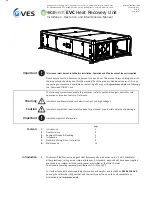
27
IM-HC 599871 0321 RABS
Product Information
2.6.1 Method 1 — Zone Control via Power Level
Zone temperature control via power levels is suitable for areas
< 64 sq. ft.
2
where a thermostat is not used. The power level operation
method monitors the temperature difference between the supply
temperature and the return temperature on the respective circuit. Each
power level represents a 2° F differential.
Power Level
Return Temp = Supply Temp Minus
Power Level 1
20° F
Power Level 2
18° F
Power Level 3
16° F
Power Level 4
14° F
Power Level 5
12° F
Power Level 6
10° F
Power Level 7
8° F
Power Level 8
6° F
Power Level 9
4° F
Power Level 10
2° F
The power level can be set using the button on a circuit hub or via the
operation software.
See
Ä
4.2 “Method 1 – Zone Control via Power Level” on page 45 to
learn how to set the power level on a circuit.
2.6.2 Method 2 — Zone Control via Thermostat
When the zone temperature is controlled with a thermostat, the control
unit achieves the desired zone temperature (target temperature) by
pulsing the powerhead of the respective circuit(s). The following inputs
are used to determine the pulsing output parameters: actual room
temperature, target temperature, supply temperature, the circuit(s) return
temperature(s) associated with that zone, and the return temperatures
on unassociated circuits.
Circuit(s) are assigned to thermostat(s) during thermostat set-up.
See
Ä
4.3 “Method 2 – Zone Control via Thermostat” on page 46 to
learn how toassign a circuit to a thermostat.
EG
1.OG
EG
1.OG
















































